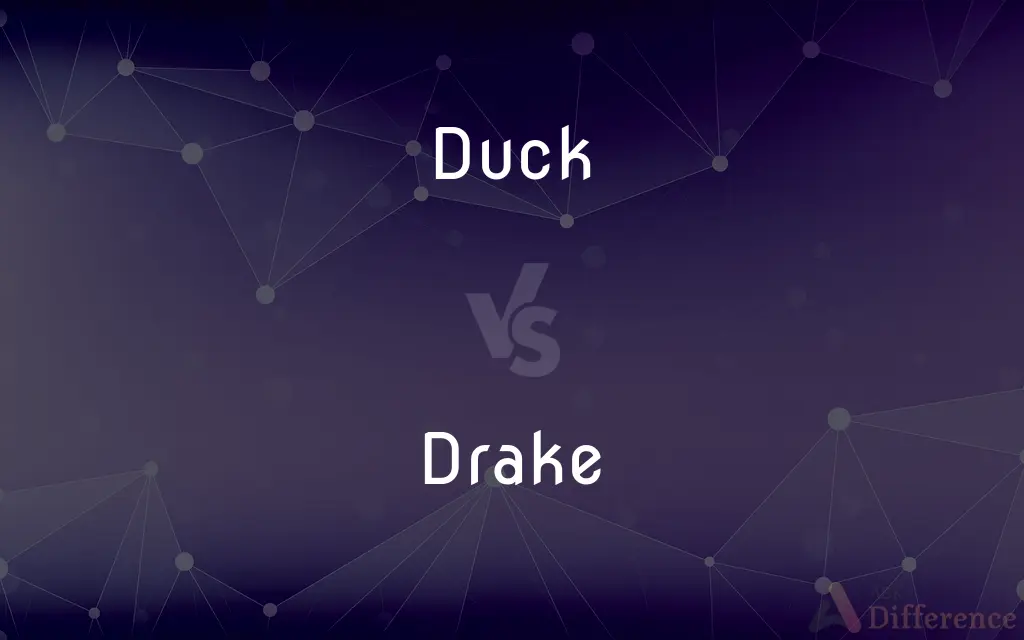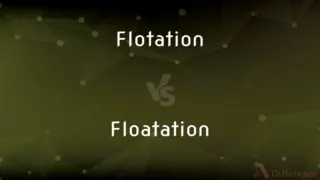Duck vs. Drake — What's the Difference?
By Tayyaba Rehman & Fiza Rafique — Updated on March 17, 2024
A duck is a general term for waterfowl in the Anatidae family, while a drake specifically refers to a mature male duck.

Difference Between Duck and Drake
Table of Contents
ADVERTISEMENT
Key Differences
Ducks encompass a wide variety of waterfowl species within the Anatidae family, including both males and females. Drakes, on the other hand, are specifically mature male ducks, distinguished by more vibrant plumage in many species.
While ducks can refer to both the entire species regardless of gender and to females specifically in colloquial use, drakes are never used to refer to females. This distinction is crucial for identification and in avian studies.
Drakes often exhibit distinct physical characteristics beyond their colorful plumage, such as different body sizes or shapes compared to females. In contrast, female ducks (often simply called "ducks" when the context is clear) typically have more camouflaged, muted colors for protection while nesting.
In mating and breeding behaviors, drakes may display more aggressive and conspicuous behaviors to attract mates or establish dominance. Ducks, particularly females, focus more on selecting nesting sites and incubating eggs, showcasing differing roles in reproduction.
While "duck" as a term can encompass the entire range of behaviors, habitats, and characteristics of these waterfowl, "drake" specifically highlights the aspects unique to mature males, including their roles in mating displays and territoriality.
ADVERTISEMENT
Comparison Chart
Definition
General term for waterfowl in the Anatidae family
Specific term for a mature male duck
Gender
Can refer to both males and females or just females
Exclusively male
Plumage
Females typically have muted colors for camouflage
Males often have more vibrant, distinct plumage
Behavior
Includes all behaviors of the species
More aggressive and conspicuous, especially during mating season
Role in Reproduction
Females focus on nesting and incubation
Males engage in mate attraction and territorial displays
Compare with Definitions
Duck
Broad Category.
Ducks can be found in both freshwater and saltwater environments.
Drake
Distinctive Features.
Some drakes have unique physical features like colored bills or curled tail feathers.
Duck
Female Identification.
Female ducks usually have less colorful plumage than males.
Drake
Vocal Differences.
Drakes may have different vocalizations compared to female ducks, often quieter and less frequent.
Duck
Diverse Diet.
Ducks can have varied diets, including aquatic plants, insects, and small fish.
Drake
Male Duck.
Drakes often have bright plumage to attract females during mating season.
Duck
Adaptability.
Ducks have adapted to a wide range of habitats around the world.
Drake
Territorial Behavior.
Drakes can be more territorial, especially in breeding territories.
Duck
Nesting Behavior.
Ducks are responsible for choosing nesting sites and laying eggs.
Drake
Mating Displays.
Drakes perform elaborate displays to court females.
Duck
Duck is the common name for numerous species of waterfowl in the family Anatidae. Ducks are generally smaller and shorter-necked than swans and geese, which are also members of the same family.
Drake
A male duck
A drake mallard
Duck
A waterbird with a broad blunt bill, short legs, webbed feet, and a waddling gait.
Drake
A male duck.
Duck
A pure white thin-shelled bivalve mollusc found off the Atlantic coasts of America.
Drake
A mayfly used as fishing bait. Also called drake fly.
Duck
An amphibious transport vehicle
Visitors can board an amphibious duck to explore the city
Drake
A male duck.
Duck
A quick lowering of the head.
Drake
A mayfly used as fishing bait.
Duck
Dear; darling (used as an informal or affectionate form of address, especially among cockneys)
Where've yer been, ducks!
It's time you changed, my duck
Drake
(poetic) A dragon.
Duck
A strong linen or cotton fabric, used chiefly for work clothes and sails
Cotton duck
Drake
(historical) A small piece of artillery.
Duck
A batsman's score of nought
He was out for a duck
Drake
A fiery meteor.
Duck
Lower the head or the body quickly to avoid a blow or missile or so as not to be seen
Spectators ducked for cover
He ducked his head and entered
Drake
A beaked galley, or Viking warship.
Duck
Push or plunge (someone) under water, either playfully or as a punishment
Rufus grabbed him from behind to duck him under the surface
Drake
The male of the duck kind.
Duck
Refrain from playing a winning card on a particular trick for tactical reasons
Declarer ducked the opening spade lead
Drake
The drake fly.
The drake will mount steeple height into the air.
The dark drake fly, good in August.
Duck
Any of various wild or domesticated waterbirds of the family Anatidae, characteristically having a broad flat bill, short legs, and webbed feet.
Drake
A dragon.
Beowulf resolves to kill the drake.
Duck
A female duck.
Drake
A small piece of artillery.
Two or three shots, made at them by a couple of drakes, made them stagger.
Duck
The flesh of a duck used as food.
Drake
Wild oats, brome grass, or darnel grass; - called also drawk, dravick, and drank.
Duck
(Slang) A person, especially one thought of as peculiar.
Drake
English explorer and admiral who was the first Englishman to circumnavigate the globe and who helped to defeat the Spanish Armada (1540-1596)
Duck
Often ducks (used with a sing. verb) Chiefly British A dear.
Duck
A quick lowering of the head or body.
Duck
A plunge under water.
Duck
A durable, closely woven heavy cotton or linen fabric.
Duck
Ducks Clothing made of duck, especially white pants.
Duck
An amphibious military truck used during World War II.
Duck
A similar vehicle used for civilian purposes, as to evacuate flood victims or for sightseeing tours. In both senses also called DUKW.
Duck
To lower quickly, especially so as to avoid something
Ducked his head as the ball came toward him.
Duck
To evade; dodge
Duck responsibility.
Ducked the reporter's question.
Duck
To push (a person, for example) suddenly under water.
Duck
In bridge, to deliberately play a card that is lower than (an opponent's card).
Duck
To lower the head or body.
Duck
To move swiftly, especially so as to escape being seen
Ducked behind a bush.
Duck
To submerge the head or body briefly in water.
Duck
To evade a responsibility or obligation. Often used with out
Duck out on one's family.
Duck
In bridge, to lose a trick by deliberately playing lower than one's opponent.
Duck
(intransitive) To quickly lower the head or body, often in order to prevent it from being struck by something.
Duck! There's a branch falling off the tree!
Duck
(transitive) To quickly lower (the head or body), often in order to prevent it from being struck by something.
Duck
(transitive) To lower (something) into water; to thrust or plunge under liquid and suddenly withdraw.
Duck
(intransitive) To go under the surface of water and immediately reappear; to plunge one's head into water or other liquid.
Duck
(intransitive) To bow.
Duck
(transitive) To evade doing something.
Duck
(transitive) To lower the volume of (a sound) so that other sounds in the mix can be heard more clearly.
Duck
(intransitive) To enter a place for a short moment.
I'm just going to duck into the loo for a minute, can you hold my bag?
Duck
(caving) A cave passage containing water with low, or no, airspace.
Duck
An aquatic bird of the family Anatidae, having a flat bill and webbed feet.
Duck
(uncountable) The flesh of a duck used as food.
Duck
(cricket) A batsman's score of zero after getting out. (short for duck's egg, since the digit "0" is round like an egg.)
Duck
(slang) A playing card with the rank of two.
Duck
A building intentionally constructed in the shape of an everyday object to which it is related.
A luncheonette in the shape of a coffee cup is particularly conspicuous, as is intended of an architectural duck or folly.
Duck
A marble to be shot at with another marble (the shooter) in children's games.
Duck
(US) A cairn used to mark a trail.
Duck
One of the weights used to hold a spline in place for the purpose of drawing a curve.
Duck
Synonym of lame duck
Duck
(medicine) A long-necked medical urinal for men.
Duck
A faggot; a meatball made from offal.
Duck
A tightly-woven cotton fabric used as sailcloth.
Duck
(in plural) Trousers made of such material.
Duck
A term of endearment; pet; darling.
Duck
(Midlands) Dear, mate (informal way of addressing a friend or stranger).
Ay up duck, ow'a'tha?
Duck
A pet; a darling.
Duck
A linen (or sometimes cotton) fabric, finer and lighter than canvas, - used for the lighter sails of vessels, the sacking of beds, and sometimes for men's clothing.
Duck
The light clothes worn by sailors in hot climates.
Duck
Any bird of the subfamily Anatinæ, family Anatidæ.
Duck
A sudden inclination of the bead or dropping of the person, resembling the motion of a duck in water.
Here be, without duck or nod,Other trippings to be trod.
Duck
To thrust or plunge under water or other liquid and suddenly withdraw.
Adams, after ducking the squire twice or thrice, leaped out of the tub.
Duck
To plunge the head of under water, immediately withdrawing it; as, duck the boy.
Duck
To bow; to bob down; to move quickly with a downward motion.
Duck
To go under the surface of water and immediately reappear; to dive; to plunge the head in water or other liquid; to dip.
In Tiber ducking thrice by break of day.
Duck
To drop the head or person suddenly; to bow.
The learned pateDucks to the golden fool.
Duck
Small wild or domesticated web-footed broad-billed swimming bird usually having a depressed body and short legs
Duck
(cricket) a score of nothing by a batsman
Duck
Flesh of a duck (domestic or wild)
Duck
A heavy cotton fabric of plain weave; used for clothing and tents
Duck
To move (the head or body) quickly downwards or away;
Before he could duck, another stone struck him
Duck
Submerge or plunge suddenly
Duck
Dip into a liquid;
He dipped into the pool
Duck
Avoid or try to avoid fulfilling, answering, or performing (duties, questions, or issues);
He dodged the issue
She skirted the problem
They tend to evade their responsibilities
He evaded the questions skillfully
Common Curiosities
How can you tell a drake from a duck?
Drakes typically have more vibrant plumage and distinct physical characteristics compared to female ducks, which tend to have more camouflaged colors.
What is a drake?
A drake is a mature male duck, often distinguishable by its more colorful plumage and specific behaviors.
Do drakes take part in raising ducklings?
Drakes generally do not participate in incubating eggs or raising ducklings, which is primarily the role of female ducks.
What is the purpose of the drake's colorful plumage?
The vibrant plumage of drakes serves to attract female ducks during mating season and can also signal their health and vitality.
Can ducks and drakes live in the same habitat?
Yes, ducks and drakes of the same species share habitats, including lakes, rivers, and coastal regions.
Are all male ducks called drakes?
Yes, the term "drake" specifically refers to mature male ducks across various duck species.
Why are male ducks called drakes?
"Drake" is a specific term used to identify mature male ducks, possibly originating from the Old English word "draca," meaning dragon, reflecting their more striking appearance.
Do drakes migrate differently than ducks?
Drakes and female ducks of the same species typically migrate together, following similar patterns and routes depending on seasonal changes and breeding needs.
What is a duck?
A duck is a waterfowl species within the Anatidae family, which can refer to both males and females or specifically to females in common usage.
What are some common behaviors of ducks?
Common behaviors include foraging for food, social interactions within flocks, mating rituals, and migratory movements.
How do ducks and drakes communicate?
Ducks and drakes use a variety of vocalizations, body movements, and displays to communicate, with differences in frequency and type between genders.
Why are female ducks less colorful than drakes?
Female ducks have more muted, camouflaged colors to help them blend into their nesting environments, providing protection from predators.
What role do female ducks play in the ecosystem?
Female ducks play crucial roles in the ecosystem by controlling insect populations, dispersing plant seeds through their diet, and contributing to the nutrient cycle through their nesting materials.
How do drakes assert their dominance?
Drakes may assert dominance through physical displays, vocalizations, and controlling access to resources or territories.
What is the significance of the drake's behavior during the breeding season?
The drake's behavior, including courtship displays and territoriality, plays a significant role in attracting mates and ensuring reproductive success.
Share Your Discovery

Previous Comparison
Loyal vs. Trustworthy
Next Comparison
Flotation vs. FloatationAuthor Spotlight
Written by
Tayyaba RehmanTayyaba Rehman is a distinguished writer, currently serving as a primary contributor to askdifference.com. As a researcher in semantics and etymology, Tayyaba's passion for the complexity of languages and their distinctions has found a perfect home on the platform. Tayyaba delves into the intricacies of language, distinguishing between commonly confused words and phrases, thereby providing clarity for readers worldwide.
Co-written by
Fiza RafiqueFiza Rafique is a skilled content writer at AskDifference.com, where she meticulously refines and enhances written pieces. Drawing from her vast editorial expertise, Fiza ensures clarity, accuracy, and precision in every article. Passionate about language, she continually seeks to elevate the quality of content for readers worldwide.














































